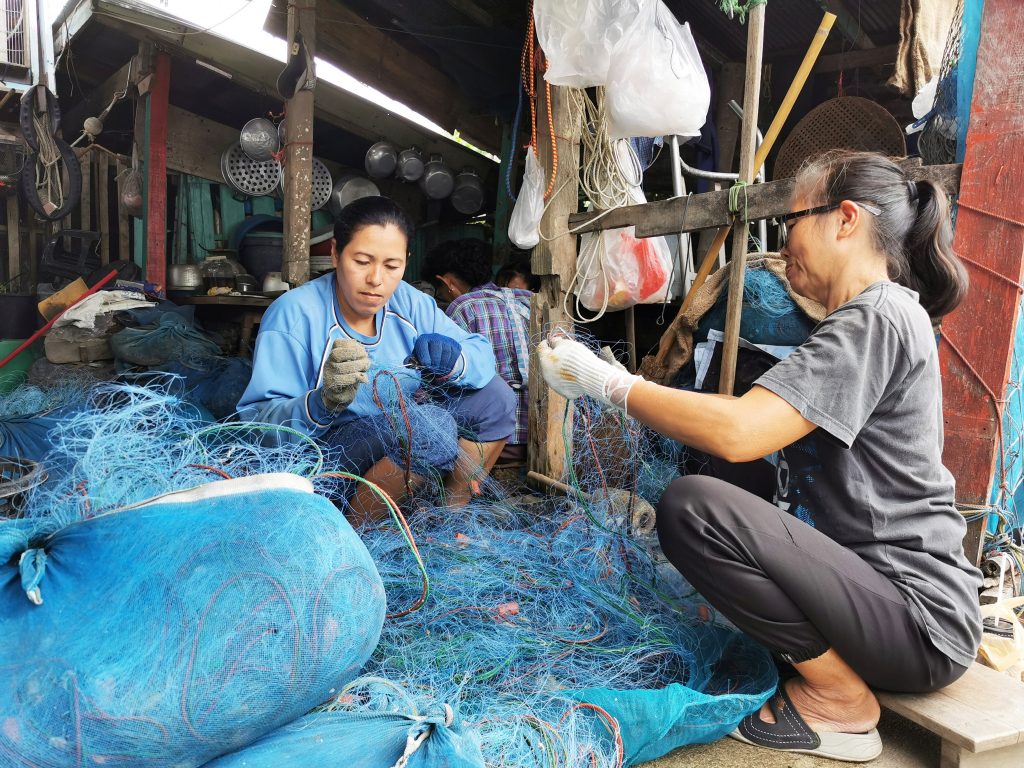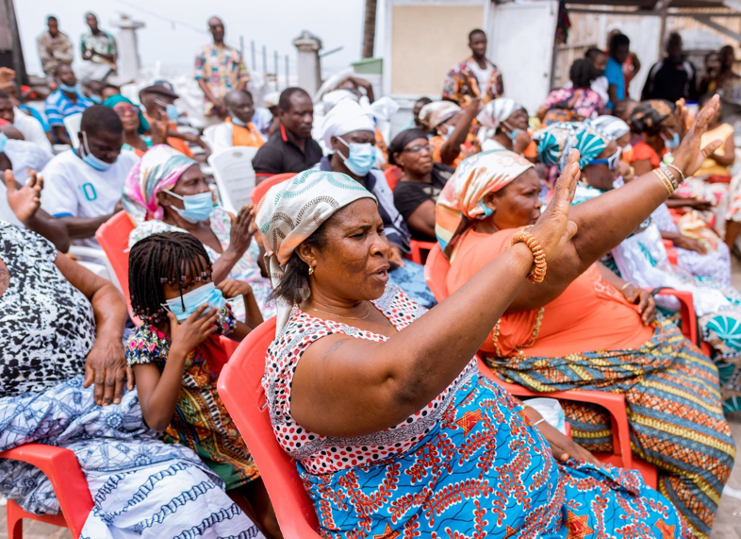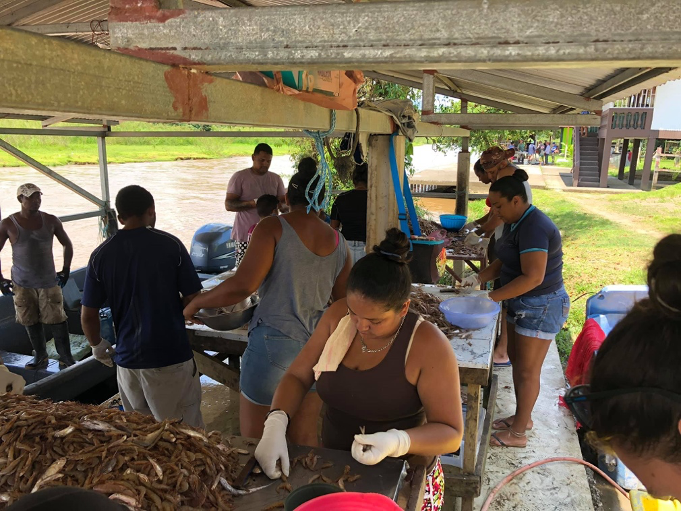Report / Food
Setting the Table
A ‘counter mobilization’ to transform corporate food systems included a Global Virtual Rally that highlighted the critical role fisheries play in food security and nutrition
This article is by Elyse Mills (elyse.icsf@gmail.com), Programme Associate, ICSF; Vivienne Solis Rivera (vivienne.solis.rivera@gmail.com), Ravadee Prasertcharoensuk (ravadee.prasertcharoensuk@gmail.com), Beatriz Mesquita (mesquitabia@hotmail.com) and Benjamin Betey Campion (bbcampion@gmail.com), Members of ICSF; Isaac Kweigyah (canoeowners@gmail.com), Chairman, Canoe and Fishing Gear Owners Association of Ghana (CaFGOAG); and Naína Pierri (pierrinai@gmail.com), Professor, Federal University of Paraná, Brazil
From 25 to 28 July 2021, civil society organizations (CSOs) from around the world participated in the Peoples’ Counter Mobilization to Transform Corporate Food Systems. The Mobilization included an eight-hour Global Virtual Rally, with contributions from 100 organizations, three roundtable discussions, and 15 independent dialogues.
The Mobilization was organized in response to the United Nations Food Systems Summit (UNFSS), which took place on 23 September 2021, and its three-day July Pre-Summit. CSOs, including the Civil Society and Indigenous Peoples’ Mechanism (CSM) and the International Planning Committee for Food Sovereignty (IPC), have been raising concerns about the Summit since it was announced in 2019, highlighting its lack of attention to addressing deep structural inequalities in food systems globally, and the failure of the Summit organizers to involve CSOs in its development. As three Special Rapporteurs on the Right to Food pointed out, CSOs were only invited to a table that had already been set.
This unique, integrated way of life that provides subsistence for small-scale fishermen and women must be protected.
The International Collective in Support of Fishworkers (ICSF), in collaboration with small-scale fishing communities around the world, participated in the Mobilization, and made contributions to the Global Virtual Rally. These contributions highlighted the critical role fisheries play in global food security and nutrition; the many challenges fishing communities face in securing their rights to gender, livelihoods, and access to fisheries resources and territories; and solutions for these challenges.
Country wise responses follow:
Costa Rica: The importance of small-scale fisheries for food security and cultural diversity
Small-scale artisanal fisheries provide food security and employment for coastal communities throughout Costa Rica. These fisheries are also important for the cultural identity, vitality, inter-generational transfer of traditional knowledge about fisheries and marine resources, and collective action and well-being. This unique, integrated way of life that provides subsistence for small-scale fishermen and women must be protected.
Small-scale fishing communities face many challenges caused by climate change and a ‘Blue Economy’ paradigm that—rather than promoting a fair and equitable distribution of benefits—generates inequitable development on the coasts and in marine areas of the country. Despite these challenges, protecting the cultural identity and productive diversity in marine territories, ensuring secure tenure rights over land and marine fishery resources, and promoting decent work for fisherwomen, including those who collect mollusks and contribute to diverse fisheries value chains, are all fundamental elements to maintaining resilient small-scale fishing communities.
Local governance
Costa Rica’s network of marine responsible fishing areas and ‘marine territories of life’ are good examples of local governance. It also ensures the participation of fishers and mollusk collectors and the integration of their traditional knowledge in management. In the face of exclusionary conservation initiatives, the fishers are fighting for the formalization of their productive activities, to ensure that their work is not criminalized. These territories are fundamental, not only for the continued existence of the artisanal sector on both of the country’s coasts (the Pacific Ocean and the Caribbean Sea), but also for the food security of thousands of Costa Ricans living in coastal areas.
Thailand: Strengthening evidence-based advocacy in small-scale fisheries and coastal aquaculture
Marine ecosystems are a source of livelihoods, food security and nutrition for small-scale fishing communities across Thailand. These communities are being negatively impacted by the expansion of coastal ‘development’ projects, such as seaports, large-scale aquaculture, industrial zones, and offshore energy and tourism projects. Small-scale coastal aquaculture, which has traditionally been practised by many small-scale fishers as an additional source of food and income, is being threatened by investment in industrial aquaculture. The government is leasing out commonly shared coastal areas to private entities, leading to food insecurity, insecure livelihoods, and loss of income for small-scale fishers.

Fisherwomen are especially vulnerable to these impacts, even as their work in mending nets, collecting mollusks, diving for fish and processing of catch has remained largely invisible. In the male-dominated fishing industry, women have been denied access to resources, have faced forced migration and have been excluded from participating in decision-making and governance processes. This has led to the marginalization of women in many fishing communities, with some forced to become daily wage labourers.
Holistic responses
These challenges require a holistic set of responses and alternatives to the current macroeconomic development paradigm. To achieve this goal, the Thailand Association of the Federation of Fisherfolk envisions greater recognition of fishers’ rights over the coastal commons, and advocates for a complete restructuring of fisheries-resource governance. This includes reversing the role of the State from owner to custodian, and bringing about policy changes that protect and promote the traditional rights of coastal communities, under the guidance of international instruments, including the United Nations Convention on the Law of the Sea (UNCLOS) and the Voluntary Guidelines for Securing Sustainable Small-Scale Fisheries in the Context of Food Security and Poverty Eradication (the SSF Guidelines).
Ghana: Canoe and Fishing Gear Owners Association call for urgent action on IUU fishing
Artisanal fishers in Ghana observed the closed fishing season from 1 to 31 July 2021 as a matter of responsibility. However, a closed season can only be effective if the illegal, unreported and unregulated (IUU) fishing practices are stopped. As key stakeholders, the members of the Canoe and Fishing Gear Owners Association of Ghana (CaFGOAG) are greatly concerned about the dying state of small-scale fisheries and are ready to support measures aimed at halting and reversing the decline in Ghana’s fisheries. They commend all artisanal fishers for accepting the period of hardship amidst the COVID-19 pandemic and emphasize that the absence of a comprehensive plan and strategy towards combating IUU fishing is not helpful in their efforts toward rebuilding their fisheries. The lack of a plan also renders various fisheries-management measures, including the closed season, ineffective.

The recent decision of the European Commission (EC) to notify Ghana with a ‘yellow card’ is an indication that not enough has been done in combating IUU fishing, particularly in illegal transshipments. The time to act is now. The CaFGOAG calls for adequate consultation and engagement with canoe and gear owners to ensure that their inputs are collated and captured to help address these issues. At this year’s UN Food Systems Summit, it is important for stakeholders to acknowledge the enormous contribution of small-scale fisheries to global food security, employment and poverty eradication, and the urgent need for governments to commit to addressing IUU, which is largely being carried out by industrial fishers. The CaFGOAG also calls for the speedy implementation of the SSF Guidelines, toward achieving SDG Goal 14; it also calls on the Ghanaian government to urgently develop a strategy to end widespread IUU fishing in the country and to protect small-scale fisheries.
The lack of a plan also renders various fisheries-management measures, including the closed season, ineffective.
Brazil: Artisanal fishers and food (in) security in the context of the COVID-19 pandemic
Brazil has approximately 1 mn professional artisanal fishers, half of them, women. The vast majority of these fishers are concentrated in the poorest regions, while most of the fish consumed in the country comes from artisanal fisheries. Despite the importance of this sector for national food security, livelihoods and food sovereignty, the sector does not receive adequate public-policy support. Many fishers lose their rights because they are not formally recognized as professionals, and fishing communities are being expelled from their territories because of the advance of other activities.

The COVID-19 pandemic, in combination with the lack of sufficient government support, has increased poverty and food insecurity. Men continued to fish during the pandemic, but sales became difficult due to lack of demand, and prices dropped. Most women had to stop fishing and stay at home to take care of children and elderly family members, consequently losing financial autonomy and becoming more exposed to domestic violence. Family incomes also decreased, making it more difficult to buy staple foods like rice and beans. Faced with this reality, fishing communities mobilized to demand food from local governments and solidarity funds, which they used to plant collective gardens, breed small animals and establish communal kitchens.
Another form of collective action during this period was the setting up of the Observatory of the Impacts of Coronavirus on Fishing Communities, which uses the Internet to bring together fisher representatives, technicians and researchers from around the country. It has become a popular health surveillance tool that collects information on the pandemic in communities, and offers preventive solutions. Used mainly as an instrument that links actors defending collective interests, and as a forum for solidarity, it is a valuable example worth replicating.
ICSF will continue to support initiatives that highlight and elevate the resilience of local communities and indigenous peoples; the crucial contributions of small-scale fisheries to global food security and nutrition; and the important role fishers and fishworkers play in transforming food systems.
For more
Sustainable fisheries and aquaculture for food security and nutrition
https://www.fao.org/3/i3844e/i3844e.pdf
Recovering Connections
Dialogues at Linha D’Água: 2022 – The International Year of Artisanal Fisheries and Aquaculture
Filling The Gap Between Theory and Practice
https://www.icsf.net/images/samudra/pdf/english/issue_85/4530_art_Sam_85_art22_Thailand_Ravadee.pdf